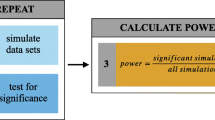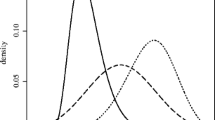Abstract
In this paper we provide an overview of the issues involved in using statistical analysis to support the process of international negotiation. We will illustrate how the approach can contribute to a negotiator's understanding and control of the interactions that occur during the course of a negotiation. The techniques are suited to the analysis of data collected from ongoing discussions and moves made by the parties. The analyses are used to illuminate influences and processes as they operate in particular cases or in negotiations in general. They do not identify a ‘best’ strategy or outcome from among alternatives suggested either from theoretical assumptions about rationality and information-processing (see Munier and Rullière's paper in this issue), from personal preference structures (see Spector's paper in this issue), or from a rule-based modeling system (see Kersten's paper in this issue). This distinction should be evident in the discussion to follow, organized into several sections: From Empirical to Normative Analysis; Statistical Analysis for Situational Diagnosis; Time-Series Analysis of Cases, and Knowledge as ‘Leverage’ Over the Negotiation Process. In a final section, we consider the challenge posed by attempts to implement these techniques with practitioners.
Similar content being viewed by others
References
Bartos, O.: 1974,Process and Outcome of Negotiations. New York: Columbia University Press.
Bendahmane, D. B. and McDonald, J. W., Jr. (Eds.): 1986,Perspectives on Negotiation. Washington, D.C.: Foreign Service Institute, U.S. Department of State.
Campbell, D. T.: 1975, ‘Degrees of freedom and the case study’.Comparative Political Studies 8, 178–193.
Coser, L.: 1967,Continuities in the Study of Social Conflict. New York: Free Press.
Druckman, D.: 1992, ‘The situational levers of negotiating flexibility’, Working Paper 92–17, Laxenburg, Austria: International Institute of Applied Systems Analysis.
Druckman, D.: 1986, ‘Stages, turning points, and crises: Negotiating military base rights, Spain and the United States’,Journal of Conflict Resolution 30, 327–360.
Druckman, D.: 1977,Negotiations: Social-Psychological Perspectives. Beverly Hills: Sage.
Druckman, D.: 1973,Human Factors in International Negotiations: Social-Psychological Aspects of International Conflict. Sage Professional Paper in International Studies, 2, 02-020. Beverly Hills: Sage.
Druckman, D. and Harris, R.: 1990, ‘Alternative models of responsiveness in international negotiation’,Journal of Conflict Resolution 34, 234–251.
Druckman, D. and Hopmann, P. T.: 1991, ‘Content analysis’, in V. Kremenyuk (Ed.)International Negotiations: Analysis, Approaches, Issues. San Francisco: Jossey-Bass.
Druckman, D. and Hopmann, P. T.: 1989, ‘Behavioral aspects of mutual security negotiations’, in P. E. Tetlock, J. L. Husbands, R. Jervis, P. C. Stern, and C. Tilly (Eds.)Behavior, Society, and Nuclear War. New York: Oxford University Press.
Druckman, D. and Hopmann, P. T.: 1979, ‘Negotiation assessment model II: Mutual and balanced force reductions’. Bethesda, Md.: Mathtech, Inc., Analytical Support Center, Report M-12.
Druckman, D., Broome, B., and Korper, S.: 1988, ‘Value differences and conflict resolution: Facilitation or delinking?’Journal of Conflict Resolution 32, 489–510.
Ekman, P., Friesen, W.V., O'Sullivan, M., Chan, A., Diacoyanni-Tarlatzis, I., Heider, K., Krause, R., Ayhrans LeCompte, W., Pitcairn, T., Ricci-Bitti, P. E., Scherer K., Tomita M., and Tzavards, A.: 1987, ‘Universals and cultural differences in the judgments of facial expressions of emotion’,Journal of Personality and Social Psychology 53, 712–717.
Fisher, R. and Ury, W.: 1981,Getting to Yes. Boston: Houghton Mifflin.
Frederiksen, N.: 1971, ‘Toward a taxonomy of situations’. Paper presented at the annual meeting of the American Psychological Association, Washington, D.C.
Guilford, J. P.: 1954,Psychometric Methods. New York: McGraw-Hill.
Hedges, L. V. and Olkin, I.: 1985,Statistical Methods for Meta-Analysis. Orlando, Florida: Academic Press.
Hopmann, P. T. and King, T. D.: 1976, ‘Interactions and perceptions in the test ban negotiations’,International Studies Quarterly 20, 105–142.
Hopmann, P. T. and Smith, T. C.: 1977, ‘An application of a Richardson process model: Soviet-American interactions in the test ban negotiations’,Journal of Conflict Resolution 21, 701–726.
Hopmann, P. T. and Walcott, C.: 1977, ‘The impact of external stresses and tensions on negotiations’, in D. Druckman (Ed.)Negotiations: Social-Psychological Perspectives. Beverly Hills: Sage.
Jensen, L.: 1988,Bargaining for National Security: The Postwar Disarmament Negotiations. Columbia, SC: University of South Carolina Press.
Job, B. L. and Duncan, G. T.: 1982, ‘Probability forecasting in international affairs’, in G. W. Hopple and J. A. Kuhlman (eds.)Expert-Generated Data: Applications in International Affairs. Boulder, Co.: Westview.
Karrass, C. L.: 1974,Give and Take. New York: Thomas Y. Crowell.
Kruskal, J. B. and Wish, M.: 1990,Multidimensional Scaling. Sage University Paper in Quantitative Applications in the Social Sciences, series no. 07-011. Beverly Hills: Sage.
Lall, A.: 1966,Modern International Negotiation: Principles and Practice. New York: Columbia University Press.
Lewis, M.: 1965, ‘Psychological effect of effort’,Psychological Bulletin 64, 183–190.
Ostrom, C.W., Jr.: 1982,Time Series Analysis: Regression Techniques. Sage University Paper on Quantitative Applications in the Social Sciences, series no. 07-009. Beverly Hills: Sage.
Randolph, L.: 1966, ‘A suggested model of international negotiation’,Journal of Conflict Resolution 10, 344–353.
Sawyer, J. and Guetzkow, H.: 1965, ‘Bargaining and negotiation in international relations’, in H.C. Kelman (Ed.)International Behavior: A Social-Psychologial Analysis. New York: Holt.
Schelling, T. C.: 1960,The Strategy of Conflict. Cambridge, Mass.: Harvard University Press.
Thibaut, J. and Kelley, H. H.: 1959,The Social Psychology of Groups. New York: Wiley.
Walcott, C. and Hopmann, P. T.: 1975, ‘Interaction analysis and bargaining behavior’,Experimental Study of Politics 4, 1–19.
Walton, R. E. and McKersie, R. B.: 1965,A Behavioral Theory of Labor Negotiations. New York: McGraw-Hill.
Winham, G.: 1979, ‘Practitioners views of international negotiation’,World Politics 32, 111–135.
Wolf, F. M.: 1986,Meta-Analysis: Quantitative Methods for Research Synthesis. Sage University Paper on Quantitative Applications in the Social Sciences, series no. 07-059. Beverly Hills: Sage.
Author information
Authors and Affiliations
Rights and permissions
About this article
Cite this article
Druckman, D. Statistical analysis for negotiation support. Theor Decis 34, 215–233 (1993). https://doi.org/10.1007/BF01075190
Issue Date:
DOI: https://doi.org/10.1007/BF01075190




